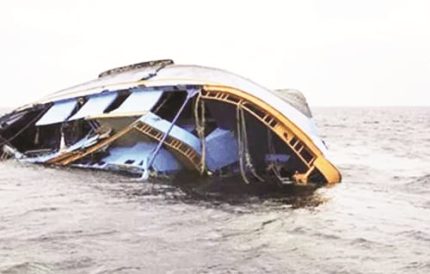In a tragic boat accident in Niger State, Nigeria, more than 100 people, mostly women and children, have been reported missing after a locally made wooden vessel capsized in the Niger River. The accident occurred in the rural district of Mokwa on Tuesday night, leaving the region in shock and prompting a massive rescue effort.
The vessel, which had a maximum capacity of 100 passengers, was carrying around 300 people when it sank, according to Abdullahi Baba-Arah, Director General of the Niger State Emergency Management Agency (NSEMA). The passengers were returning from an Islamic religious festival, the Annual Maulud celebration, when the accident occurred around 8:30 p.m. local time. Rescue operations have been ongoing since the incident, with 150 people rescued so far.
Rising Casualties and Rescue Efforts Continue
As of Wednesday morning, emergency officials confirmed that nine bodies had been recovered, including two females and seven males. Later updates suggested the death toll could be far higher, with the Council Chairman of Mokwa Local Government Area,of Niger State ,Abdullahi Muregi, confirming the recovery of approximately 60 bodies.
Despite these rescue efforts, the chances of finding more survivors remain slim, according to local experts and boat operators. Ismaila Umar, leader of an association of boat skippers in Mokwa, told opitanglobamedia that hopes of finding additional survivors were fading. He added that the boat disaster is reminiscent of a similar tragedy that struck the same region 18 months ago, where over 100 people lost their lives in another boat accident.
Regulatory Failures and Overloading as Causes
Preliminary investigations into the cause of the accident have pointed to overloading as a likely factor. The boat was reportedly designed to carry no more than 100 people but was loaded with almost 300 passengers at the time of the accident. Salihu Garba, Director of Relief and Rehabilitation at the Niger state emergency services, explained to The Associated Press that the boat’s structural integrity was compromised due to the excessive load, leading to the tragedy.
Experts have long warned about the dangers of poorly maintained boats and lax regulatory enforcement in Nigeria, particularly in rural areas where water transportation is a key mode of travel. Boat accidents have become increasingly common in the country, with many pointing to systemic failures in safety standards and enforcement of capacity limits.
Investigations and Future Prevention Measures of boat mishap in Niger state
NSEMA Niger State Emergency Management Agency has launched an official investigation into the accident to determine the exact causes of the tragedy. Abdullahi Baba-Arah confirmed that while overloading is a suspected factor, the NSEMA is looking into other potential contributing causes. The findings of this investigation are expected to provide crucial information that could help prevent future occurrences.
In the meantime, calls for stricter regulations and better enforcement of boat safety standards are growing. Local authorities, including Mokwa’s Council Chairman, of Niger State have vowed to work with national agencies to address the regulatory gaps that have allowed such incidents to happen repeatedly. The hope is that through concerted efforts, such tragedies can be minimized, and the safety of travelers on Nigeria’s waterways improved.
Ongoing Rescue Operations Amid Growing Concerns
Rescue efforts have intensified in the Mokwa district, with the support of local volunteers and divers. The search for the missing passengers continues, though hopes of finding survivors diminish with each passing day. As of Wednesday, the bodies of nine men and two women have been recovered, according to local media reports. The National Emergency Management Agency (NEMA) is coordinating with local authorities to support the rescue mission.
Nigerian boat disasters, particularly in remote regions, remain a frequent occurrence, exacerbated by poor infrastructure and unsafe transportation practices. Local communities, already grappling with the loss, have joined authorities in demanding immediate government action to prevent further tragedies. Public safety advocates emphasize the need for better oversight, infrastructure development, and education on the dangers of overloading, to mitigate the rising toll of boat accidents in the country.
Table of Contents
Discover more from OGM News NG
Subscribe to get the latest posts sent to your email.














